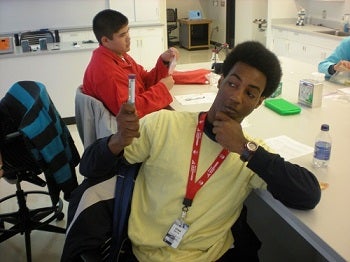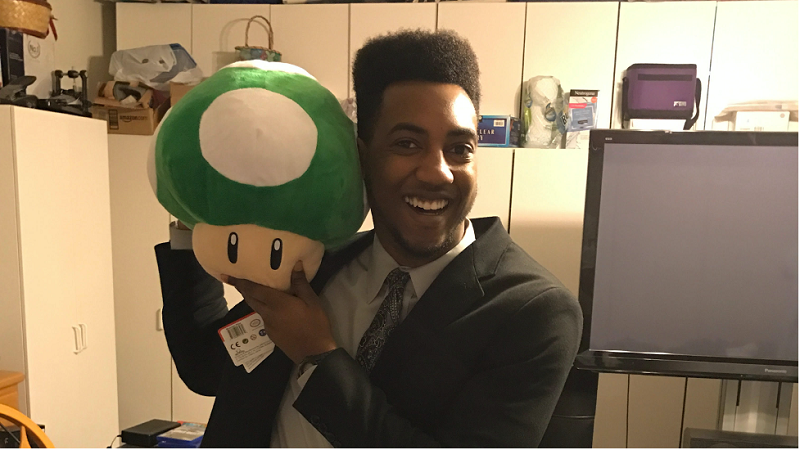I look at proteins that play a role in ALS-associated neurodegeneration. I’m specifically studying a nucleic acid binding protein called TDP-43. About 97% of ALS patients end up with TDP-43 in the cytoplasm of motor neurons when it’s supposed to be in the nucleus. I’m trying to investigate the effects of this re-localization on motor neuron function and how other proteins might serve as ‘modifiers’ of this phenotype. In other words, I’m looking for other proteins and genes that may positively or negatively affect neurodegeneration in the context of TDP-43 disruption.
How did you become interested in neuroscience?
My interest in neuroscience grew out of a combined curiosity about human biology and how electrical systems work. I started college thinking I was going to do electrical engineering because that was the type of engineering that I had been exposed to the most during high school. Both my parents were trained as industrial engineers and my dad worked in the semiconductor industry for a long time, so I was pushed to explore types of engineering similar to their expertise such as electrical engineering. I walked into undergrad at MIT thinking I was going to do something like what my parents did because I knew I was curious about that field, but then I thought, “Oh, well you know what’s more complicated than a robot? A person.” I did not have any experience with biology beyond AP Bio when I had this thought, but I got very excited when I thought about learning about the system that is the human body and engineering something that could treat disease or otherwise make living in a human body a better experience.
At first, I thought I would accomplish this goal by being a doctor. I had chosen bioengineering as my primary major and quickly noticed that although we talked a lot about tissue systems that had definitive non-biological proxy models, such as your blood vessels being represented by leaky pipes or your bones being represented by levers, we seldomly talked about the central control center of the body – the brain. I worked in a neuroscience lab for a year during undergrad to fill some of these knowledge gaps that I was curious to explore. My motivation for seeking out a neuroscience lab was simply that I found the brain to be so interesting. We know basically nothing about it. We have a lot of very concrete solutions to a lot of other medical issues, like how to fix a broken arm, and how to handle a lot of metabolic issues, and even manage things like diabetes. Yet unfortunately, when you’re talking about things like mental illness and psychiatric conditions and neurodegenerative conditions, there’s generally not a whole lot you can do. I think there’s a huge need there for more research to understand what’s going on molecularly. As I fell more in love with molecular biology research techniques and thinking about how to apply those to problems in neuroscience, I eventually fell off the pre-med train and decided to make a go at being a researcher. I didn’t always work on neuroscience problems (I spent 3 years doing cancer research at the Broad Institute immediately after undergrad), but I knew I wanted to come back to that field. I am incredibly curious about what’s going on in our brains and I hope by figuring out how the cellular systems of the brain work, I can find room to engineer solutions for diseases and disturbances that may disrupt normal function.
Until relatively recently we didn’t even have a system to ask these very molecular bio questions in a neurologically relevant system. One of the things that really drew me to the Eggan Lab was the system we have for turning human IPSCs (induced pluripotent stem cells, which can be derived from skin or blood cells) into neurons and using those neurons to address a lot of mechanistic questions. Questions which may seem really basic on the surface, but do a lot to formulate our understanding of the problems underlying many nervous system diseases.

Stan at space camp in high school, performing a DNA extraction for the first time
So did you grow up wanting to be an engineer? Or was there something else you wanted to be when you were a kid?
Yeah, way back when what I really wanted to be was a detective. I didn’t really know that being a detective was basically being a level five cop; I just knew I was really into mysteries, and I liked the process of putting together the different pieces of a story. Looking back, maybe what I was imagining was closer to what a lawyer does than a detective. What both of those careers and my current job have in common is curiosity.
You shared before that you really like teaching. Why? What do you most enjoy about it?
I believe that in order to be a successful scientist, you have to be able to effectively communicate your science. There are a lot of instances, historically and anecdotally, where messages conveyed by scientists have been wildly misinterpreted and I think part of that problem lies in us who do the work needing to work to be better communicators to the public. Of course you can’t prevent selective listening (which is why it’s extremely important to be thoughtful when phrasing research around certain topics), but I think we as a scientific community can mitigate the problem of lack of public understanding around important advances or discoveries by being intentional about how we present the information.
So, I think it’s super important to make sure that I’m presenting my work in a clear and accessible fashion. I think one of the best ways for me in particular (and hopefully others!) to practice that is through teaching. I think that learning to communicate through teaching advances the idea that inevitably the science needs to leave your hands. It has to make sense to others to make an impact that spreads beyond where you and your lab are, and we need to do the work to make sure that understanding is accessible.
A secondary reason why I really like teaching is because there aren’t a lot of scientists who look like me. I don’t meet a lot of black scientists. I met my first black scientist when I was a tech at the Broad—after I’d completed my undergraduate years at MIT. I think it’s very important to make sure that if anyone else out there is looking for a role model in that space, I can be there for them. I want to show up and make sure people know that just because there isn’t someone out there who looks like you, that shouldn’t be a barrier. I want to make sure that people feel comfortable being able to operate in this space.
You are also passionate about community outreach. Can you share a little about the outreach programs are you involved in?
I’m one of the executive directors of a program called HPREP, the Health Professions Recruitment & Exposure Program. We are online now, but what we normally do is bring in 60 high school kids from the Boston area. Mostly kids who are black, brown, and/or Latinx. A lot of the kids qualify for free or reduced lunch plans. These are kids that come from places that don’t have a ton of resources and are very interested in the medical sciences, biology, and health science in general.
We bring them to the HMS campus, transportation and food costs covered among other benefits, for ten Saturdays over the course of the winter in the morning they get lectures on health science topics like cancer, neuroscience, and other biological and medical topics. Some examples of what we discuss are things like how to determine a patient’s vital signs, case studies about the social determinants of medicine, and other topics that would be of interest to people who are going to apply to med school or grad school in the future. In the second half of the day, they get paired with a mentor who is a grad student, med student, or postdoc, and that mentor leads them through a curriculum where they get training on public speaking and interviewing. They also learn how to write essays. We help with summer program applications for the underclassmen, and college applications for the seniors. Their final project is a scientific research presentation that they give to their mentor pod group at the end of the season. We support them through every step of the process on all these fronts. It’s an absolute joy watching the kids improve their scientific chops and in general get more confident to tackle the big challenges of world.
What do you most admire in others?
A combination of discipline, patience, and perseverance. The type of person I’ve always looked up to is someone who can really sit with themselves and say, “Okay, this is what’s going well, and this is what’s not. What can I do to try and move the ball forward and reach my goals?”
What do you do for fun?
I’ve been playing the clarinet for almost 20 years. I also play drums occasionally. I love having conversations with people. I play a lot of video games. I especially like to play story-driven games and games that are about solving problems. I also like to cook. Cooking’s a lot like science. I exercise a fair bit as well. I’m also into trivia. For a while I was organizing and hosting bar trivia at one of the MIT bars—and since retiring from that gig I now freelance, occasionally writing trivia for anyone who asks.

